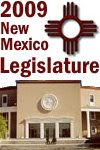Speed is more important than transparency? Even considering the scandal-plagued culture in Santa Fe? You’ve got to be kidding me.
Once upon a time, a newly elected New Mexico attorney general named Gary King told me he wasn’t going to jump into the fight over whether legislative conference committees should be open to the public.
 King said during an interview in February 2007, a little more than a month after he took office, that he had no position on whether conference committees should be open to the public because it’s a legislative, not an executive, issue.
King said during an interview in February 2007, a little more than a month after he took office, that he had no position on whether conference committees should be open to the public because it’s a legislative, not an executive, issue.
Apparently, something has changed. King took a public position last week: He was quoted by The Santa Fe New Mexican as saying he is “not in favor of a blanket rule that conference committees have to be open all the time.”
“There are times when it’s appropriate to have closed meetings,” King was quoted by the newspaper as saying.
When? And why? How can the attorney general, who has his own package of ethics-reform proposals in the current legislative session, who travels around the state to educate government officials about compliance with the state’s open meetings act, and who has been a longtime champion of open government, say that the public should be shut out of meetings at which taxpayer dollars can be appropriated and policy can be made?
Conference committees are those meetings at which legislators from the House and Senate meet — currently in secret — to reconcile differences between versions of the same bill that have been passed by both chambers. They can — and sometimes do — make quite significant changes to important legislation.
A proposal to open the committee meetings to the public has passed the House but been narrowly defeated on an annual basis in the Senate. The proposal will be debated in the Senate this year as Senate Bill 150, and it’s sponsored, as usual, by Dede Feldman, D-Albuquerque. Though the bill has not yet been introduced this year in the House, it’s usually sponsored by Joseph Cervantes, D-Las Cruces.
King’s proposals miss the mark
King told The New Mexican that he is “in favor of openness,” but said “the public also is served by a process that gets you to a conclusion.” Keeping conference committees closed speeds up the process, he was quoted as saying.
King told The New Mexican he is proposing two changes to closed conference committees. The first would stipulate that the budget conference committee can’t add anything to the budget that isn’t already in the bills approved by the House and Senate. The second would require 24-48 hours before the House and Senate could vote to accept the conference committee report on the budget, giving other legislators and the public time to scrutinize the changes.
King made those suggestions to me in 2007, even as he refused to take a position on whether conference committees should be open or closed. His first proposal apparently already exists as a rule, but it’s broken all the time.
Regardless, King’s proposals completely miss the mark. Speed is more important than transparency? Even considering the scandal-plagued culture that exists in Santa Fe? You’ve got to be kidding me.
Opening conference committees is a no-brainer
Currently, projects that make their way into the budget after public debate and public votes can be removed by a handful of lawmakers behind closed doors, and it’s possible no one would know about it until it’s too late. Perhaps even more devious is the reality that, in closed conference committees, lawmakers can make tiny changes to the wording of bills that could go undetected but would alter the meaning of state statutes.
No one should be entrusted with the power to do that in secret. There’s nothing about closed conference committees that is ethical or proper. That truth far outweighs the burden of the additional time it takes to reconcile differences between House and Senate versions of a bill in public. King and a number of legislators might think that, in the case of conference committee meetings, it’s inconvenient to have to make public policy decisions in full view of the public, but the reality is that there isn’t any other ethical way to do it.
King told The New Mexican, as he told me two years ago, that he believes the matter of open or closed conference committees is a legislative concern. He said he isn’t lobbying hard against the bill to open the meetings to the public. But the announcement of his support for closed committee meetings gives a boost to those who want to keep the meetings secret. King is not politically naïve, and he had to know that would happen when he announced his position.
King, a longtime proponent of open government, appears to be using his weight in this instance to help ensure that the Legislature can keep legally operating in the dark. That’s sad.

